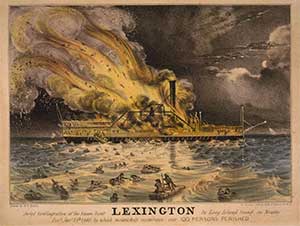Dickens in America > Perils of Steam
The Charles Dickens Page
The Perils of Steam
A portion of Dickens' letter to his friend John Forster on the decision to return home by sail rather than steam

Steamship Lexington which caught fire and sank on January 13, 1840 taking 139 souls with it.
We mean to return home in a packet-ship -- not a steamer. Her name is the George Washington, and she will sail from here, for Liverpool, on the seventh of June. At that season of the year, they are seldom more than three weeks making the voyage; and I never will trust myself upon the wide ocean, if it please Heaven, in a steamer again. When I tell you all that I observed on board that Britannia, I shall astonish you. Meanwhile, consider two of their dangers. First, that if the funnel were blown overboard, the vessel must instantly be on fire, from stem to stern: to comprehend which Consequence, you have only to understand that the funnel is more than 40 feet high, and that at night you see the solid fire two or three feet above its top. Imagine this swept down by a strong wind, and picture to yourself the amount of flame on deck; and that a strong wind is likely to sweep it down you soon learn, from the precautions taken to keep it up in a storm, when it is the first thing thought of. Secondly, each of these boats consumes between London and Halifax 700 tons of coals and it is pretty clear, from this enormous difference of weight in a ship of only 1,200 tons burden in all, that she must be either too heavy when she comes out of port, or too light when she goes in. The daily difference in her rolling, as she burns the coals out, is something absolutely fearful. Add to all this, that by day and night she is full of fire and people, that she has no boats, and that the struggling of that enormous machinery in a heavy sea seems as though it would rend her into fragments (Letters, 1974, v. 3, p. 88-89).
